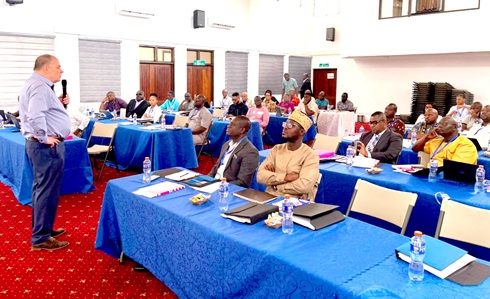
World Bank partners GCEA in training programmes
The World Bank has entered into a partnership with the Ghana Consulting Engineers Association (GCEA) to offer continuous training and capacity building in contract management within West and Central Africa regions.
With extensive experience and expertise in the delivery of procurement and project management related trainings, the GCEA will facilitate the training, which will be held annually through a certified FIDIC trainer.
The maiden edition began last Monday, and it is expected to end on Friday, April 19 at the Engineering Centre, Roman Ridge, Accra with 50 participants from Ghana, Cape Verde, Sierra Leone and Liberia.
Training
Opening the training workshop, the Vice-President of GCEA, Festus Odametey, explained that the training would ensure the effective management of World Bank projects, which include 355 active projects amounting to $58billion and 72 projects in the pipeline worth $12billion.
The training, he said, would further help in achieving sustainable project development outcomes, adding that the it would be based on the FIDIC Red Book. He said GCEA, in partnership with FIDIC and sponsorship from the World Bank, was providing the technical training for staff across the project implementation units for World Bank projects in Ghana, Liberia, Sierra Leone and Cape Verde.
Expertise
The Operations Manager of the World Bank, Michelle Keane, said, “GCEA has extensive expertise in the delivery of contract management related trainings within the sub-region and being an accredited FIDIC Training Centre gives some quality assurance of the training being delivered”.
She further emphasised that the training would be held annually but the maiden edition was fully funded by the World Bank and hence absolutely free for all participants. “The Bank is thus, hopeful that this collaboration is going to be sustained for the benefit of not only the World Bank projects but the region as a whole and leading to the achievement of sustainable development outcomes,” she said.
Mr Keane highlighted the bank’s procurement framework emphasising effective contract management as part of the general procurement processes. “Obviously, the Procurement Regulations for Borrowers is not limited to the selection process but go beyond and above contracts awards and signing.
Therefore, contract management planning must be considered in the development phase of the project's procurement strategy and should be considered part of the overall approach to procurement,” she said.
For his part, a Senior Procurement Specialist at the World Bank, Buniyaminu Abdul Kadiri, indicated that the poor contract management was quite pervasive within the region especially on high value infrastructural contracts.
“These contract management lapses usually lead to contract duration overruns, interest on delayed payments, claims on idle time as well as resources, which affect the delivery of project development objectives and leads to slow disbursements.
“This collaboration will thus go a long way to improve delivery on World Bank funded projects,” he said.
